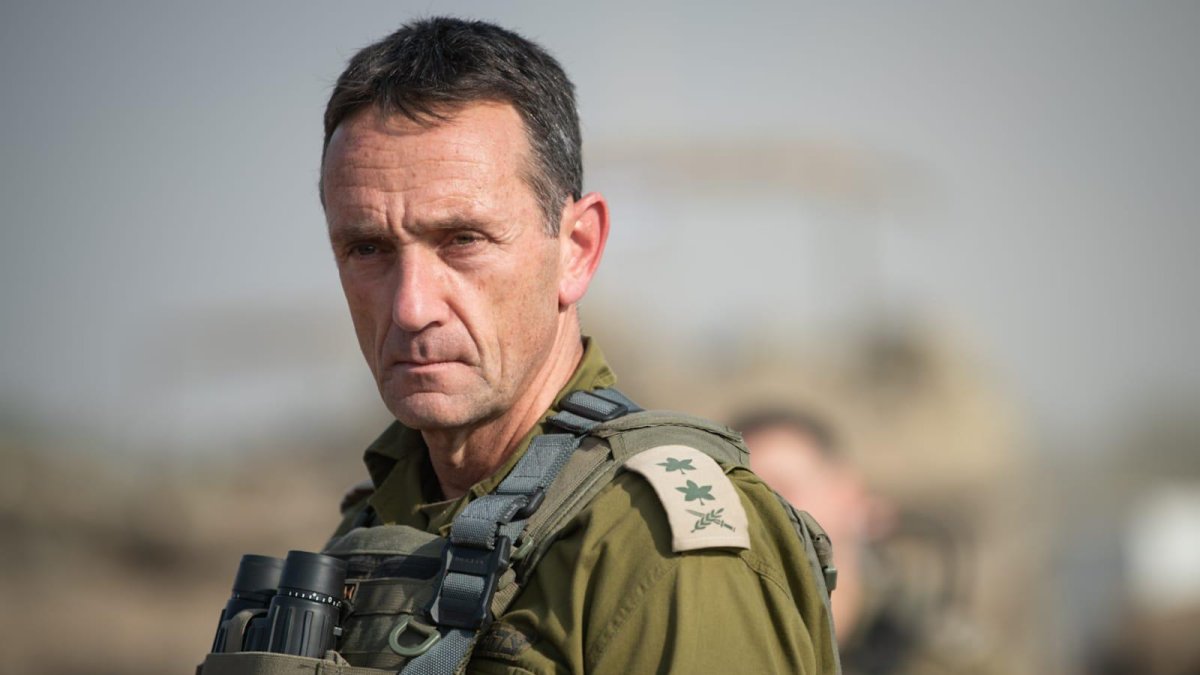Israeli Chief of Staff: Iranian attack "will receive a response"
Lt. Gen. Herzi Halevi, commander in chief of the Israel Defense Forces, promised retaliation for Iran's bombing although he did not offer further details.

Herzi Halevi, jefe de las Fuerzas de Defensa de Israel (Wikimedia Commons).
The commander-in-chief of the Israel Defense Forces, Lieutenant General Herzi Halevi, assured in a speech on Monday that Israel would respond to Iran's historic combined attack last weekend. The Ramatkal did not specify, however, when or how the Israeli retaliation will be.
"Iran wanted to damage the strategic capabilities of the State of Israel, something that had not happened before. We were prepared for Operation 'Iron Shield,' preparation that led Iran to also encounter air superiority," said Lieutenant General Halevi in his statement from the Nevatim military air base, one of the few places that were hit by the Iranian attack.
"We are looking forward, we are considering our steps, and this launch of so many missiles, cruise missiles and unmanned aerial vehicles against the territory of the State of Israel will have a response," he added.
With these statements from the IDF leader, Israel has not closed the door to a direct attack on Iranian territory. In the days before the massive bombardment with missiles and drones by the Islamist regime, several intelligence sources and Netanyahu's own government assured that if the attack came from Iran, Israel would respond with attacks on its nuclear infrastructure.
The international community unites against
Several European countries with international relevance and the Biden Administration itself are concentrating their efforts on avoiding Israeli retaliation against Tehran. The United Kingdom and the European Union are also among those asking Israel for caution, given the possibility of the conflict escalating further.
Some other voices believe that not retaliating against Iran would mean giving strength to the ayatollah regime. Iran is considered one of the great destabilizing forces in the Middle East, especially by the United States' regional allies in the Arabian Peninsula, with the exception of Qatar.
Israel would have persuaded these same Arab countries that an armed response to Iran's attack would not endanger them. According to a report by Israeli public broadcaster Kan, picked up by the Times of Israel, Israel informed Jordan, Egypt and the Gulf States that its response, when it comes, will be carried out in such a way that Iran cannot implicate them in retaliation. Some of these countries collaborated with the United States and Israel during Operation Iron Shield to intercept Iranian projectiles.
Diplomatic offensive against Iran
For the moment, Natanyahu's Government is looking for alternative ways to the war response. This Tuesday, Israeli Foreign Minister Israel Katz sent letters to 32 governments asking to impose new international sanctions against Iran. Katz proposed blocking the Iranian missile program as well as designating the Islamic Revolutionary Guard Corps as a terrorist organization.
Katz agreed with General Halevi's statements and assured that his diplomatic offensive accompanies a planned "military response."
The United States rules out war escalation
Several Biden Administration sources told NBC that Israel will not directly attack Iran. NBC cites four sources who assured that retaliation will be directed at the Islamist regime's proxies instead of its own infrastructure.
This could involve new attacks on Hezbollah group positions in Lebanon. Hezbollah, a Shiite political-military group close to Tehran, also participated in the offensive against Israel last weekend. The first round of rockets was fired from Lebanon on Friday, hours before the unloading from Iran began. Iran's resources and allies in Syria could be another target on which the IDF could carry out airstrikes.
They will go on the defensive
After their attack with more than 300 aerial projectiles, drones and missiles, the Iranian Islamist regime has gone on the defensive. President Ebrahim Raisi, second in rank after Ayatollah Khamenei, published an official statement collected by AFP in which he warned that his Government will respond "severely" to "the slightest action" by Israel against "Iran's interests."
Tehran considers its armed attack to be a legitimate defense after the Israeli bombing of a building attached to its consulate in Damascus, Syria. This building was used by members of the Islamic Revolutionary Guard. According to AFP, Raisi had a telephone conversation with the emir of Qatar, Tamim Al Thani, on Monday. "Now, we firmly declare that the slightest action against Iran's interests will elicit a severe, extensive and painful response against all its perpetrators," Raisi then told the Qatari emir, according to media reports.

























